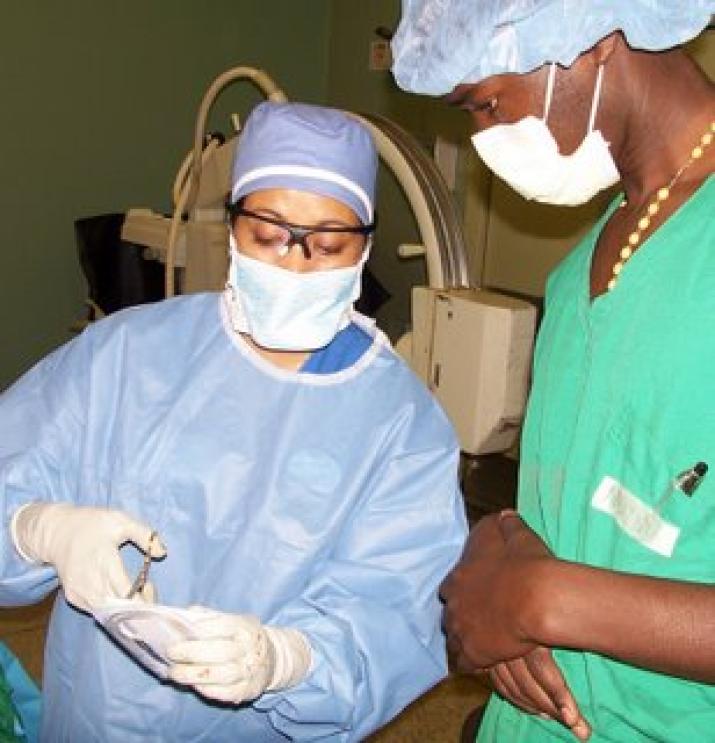Four years after neurosurgeon and DGHI affiliate Michael Haglund delivered the first of three shipments of surgical equipment to Kampala’s New Mulago Hospital, new evidence shows the influx of technology coupled with an advanced training program for Ugandan health care providers has resulted in increased surgical capacity in the country.
In the World Journal of Surgery in April, Haglund and his team found that in two years, the number of neurosurgical cases nearly tripled at New Mulago Hospital. Ugandan trained neurosurgeons saw more patients, performed more complex surgeries and increased overall productivity. The data shows a 180 percent increase in the number and complexity of surgeries performed, and this was maintained when there was no Duke presence on-site. The utilization of operating rooms also doubled during this time despite no change in the number of hospital admissions.
“This is the first time, to our knowledge, that this kind of data is available for a short-term training program combined with a significant technology influx in East Africa,” said Haglund, lead author of the study and professor of surgery and neurobiology at the Duke University Medical Center. “Our results show the lasting value of twinning two health systems with the successful transfer of skills and technology.”
The study involved four years of data comparing surgical care offered at New Mulago Hospital before and after the establishment of the East African Neurosurgery Training Program. New Mulago Hospital operating rooms were newly renovated and equipped with 21 tons of essential medical equipment valued at $4 million via the Duke Global Health PLUS (Placement of Life-changing Usable Surplus) Program. Duke physicians also trained Ugandan neurosurgeons, anesthesiologists and nursing staff on how to use the equipment, as well as increase clinical efficiency and perform more complex surgeries. Following the training, Ugandan neurosurgeons had the skills to perform surgery for brain, posterior fossa, and spinal cord tumors.
Haglund first witnessed the massive disparities that existed in Uganda’s national hospital in 2007. The need to build surgical capacity in East Africa is vast with 27 neurosurgeons serving more than 250 million people. In Uganda alone, there are five neurosurgeons serving roughly 30 million people. Prior to the GH PLUS program, the New Mulago National Hospital had only one functioning ventilator, which was not in the operating room. Additionally, there was no monitoring or surgical equipment, except for a manual blood pressure cuff, hand drill and bovie cautery.
By using a top-down approach to deliver highly complex neurosurgery through local providers, the Duke/New Mulago Hospital Program serves as a model partnership to positively impact a health system in a low-income country with few resources and minimal manpower.
“Twinning involves not just the health systems, but all the dedicated individuals who partner in an ongoing way with their specific counterparts to make the program function at a high level,” said Haglund of the training program, which currently has two trainees with two more being added this summer. “The goal is by 2020 to have 12 newly trained neurosurgeons in Uganda, bringing the total to 17, who will be spread out across the country.”
Other authors of the paper include Joel Kiryabwire, Stephen Parker, Ali Zomorodi, David MacLeod, Rebecca Schroeder, Michael Muhumuza and Michael Merson.
The East African Neurosurgery Training Program involves the support of many administrators and medical professionals both at Duke and in Uganda. At Duke, this includes collaborators at the Duke University Medical Center’s Departments of Surgery, Anesthesiology, Nursing and Clinical Engineering, as well as the Duke Global Health Institute. In Uganda, this includes senior leadership at New Mulago National Hospital and faculty of the Surgery and Anesthesia Departments, Makerere University Medical School and the Ugandan government.
The Global Health PLUS program is housed in the Duke Global Health Institute. It is part of a larger surplus program of Duke University and Duke Medicine organized through Duke University Procurement.
The Duke/New Mulago Hospital Program serves as a model partnership to positively impact a health system in a low-income country with few resources and minimal manpower.



